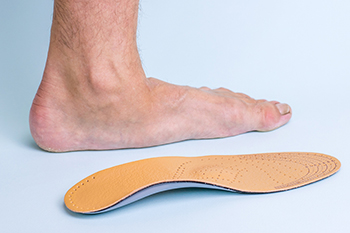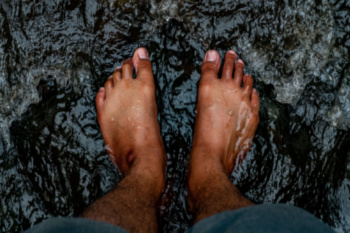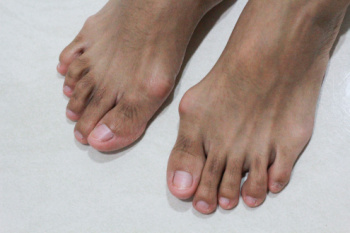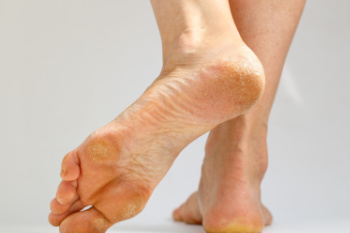Items filtered by date: December 2024
Why Do I Have Swollen Feet?

Swollen feet can be an uncomfortable issue, often caused by injuries or edema. Edema refers to the accumulation of fluid in the tissues, leading to swelling. People who are more likely to experience swollen feet include those with recent injuries, such as sprains or fractures, which can cause localized swelling. Edema can also result from conditions like pregnancy, heart disease, kidney disease, or prolonged standing or sitting. The causes of swollen feet vary, but other contributing factors include poor circulation, high salt intake, or side effects from medications. In some cases, swelling may be a sign of a more serious underlying issue, such as blood clots, infections, or vascular problems. While mild swelling may improve with rest, elevating the feet, or wearing compression socks, persistent or severe foot or ankle swelling should be evaluated by a podiatrist. This type of doctor can help diagnose the cause of the swelling and recommend appropriate treatments. If you are experiencing swollen feet, it is suggested that you schedule an appointment with a podiatrist.
Swollen feet can be a sign of an underlying condition. If you have any concerns, contact Brandon M. Zuklie, DPM of New Jersey. Our doctor can provide the care you need to keep you pain-free and on your feet.
Swollen feet are a common ailment among pregnant women and people who stand or sit for extended periods. Aging may increase the possibility of swollen feet and patients who are obese often notice when their feet are swelling too. There may be medical reasons why swollen feet occur:
- Phlebitis - A condition that causes the veins to become inflamed and can also cause leg pain.
- Liver disease - This may lead to low blood levels of albumin which is a protein. This can cause fluid in the blood to pass into the tissues and several areas of the body can become swollen.
- Heart failure - When the heart doesn’t pump properly the blood that is normally pumped back to the heart can pool in the veins of the legs causing swollen feet.
- Kidney disease - One of the main functions of the kidneys is releasing excess fluid in the body. This type of condition can make it difficult for the kidneys to function properly, and as a result the feet may become swollen.
- Deep-vein thrombosis (DVT)- This is a serious condition where blood clots form in the veins of the legs. They can block the return of blood from the legs to the heart which may cause the feet to swell. It is important to be treated by a podiatrist if this condition is present.
Swollen feet can also be caused by bone and tendon conditions, including fractures, arthritis, and tendinitis. Additionally, there may be skin and toenail conditions and an infection may cause the feet to swell. Patients who take medicine to treat high blood pressure may be prone to getting swollen feet.
Many patients elevate their feet to help relieve the swelling and this is generally a temporary remedy. When a podiatrist is consulted the reason behind the swelling can be uncovered and subsequently treated.
If you have any questions please feel free to contact our offices located in Piscataway, Jamesburg, and Branchburg, NJ . We offer the newest diagnostic tools and technology to treat your foot and ankle needs.
We Can Treat Your Foot or Ankle Pain
Arch Support Benefits for Flat Feet

Arch support orthotics offer significant advantages for individuals with flat feet, enhancing their walking and standing mechanics. These specialized inserts are designed to align and stabilize the foot, addressing issues caused by fallen arches. By redistributing weight across the sole, they reduce strain on the foot, improving stance time and pace while minimizing discomfort during movement. Flat feet often lead to uneven plantar pressure, which can cause pain or fatigue over time. Arch supports alleviate this by providing structured cushioning that balances foot pressure and increases contact area for better support. Determining the need for these insoles requires a professional evaluation. A podiatrist can assess foot structure, gait, and pressure distribution using advanced diagnostic tools. If you have flat feet that are causing you discomfort, it is suggested that you schedule an appointment with a podiatrist to see if orthotics are recommended for you.
If you are having discomfort in your feet and would like to try orthotics, contact Brandon M. Zuklie, DPM from New Jersey. Our doctor can provide the care you need to keep you pain-free and on your feet.
What Are Orthotics?
Orthotics are inserts you can place into your shoes to help with a variety of foot problems such as flat feet or foot pain. Orthotics provide relief and comfort for minor foot and heel pain but can’t correct serious biomechanical problems in your feet.
Over-the-Counter Inserts
Orthotics come in a wide variety of over-the-counter inserts that are used to treat foot pain, heel pain, and minor problems. For example, arch supports can be inserted into your shoes to help correct overarched or flat feet, while gel insoles are often used because they provide comfort and relief from foot and heel pain by alleviating pressure.
Prescription Orthotics
If over-the-counter inserts don’t work for you or if you have a more severe foot concern, it is possible to have your podiatrist prescribe custom orthotics. These high-quality inserts are designed to treat problems such as abnormal motion, plantar fasciitis, and severe forms of heel pain. They can even be used to help patients suffering from diabetes by treating foot ulcers and painful calluses and are usually molded to your feet individually, which allows them to provide full support and comfort.
If you are experiencing minor to severe foot or heel pain, it’s recommended to speak with your podiatrist about the possibilities of using orthotics. A podiatrist can determine which type of orthotic is right for you and allow you to take the first steps towards being pain-free.
If you have any questions please contact our offices located in Piscataway, Jamesburg, and Branchburg, NJ . We offer the newest diagnostic and treatment technologies for all your foot and ankle needs.
What Can Be Done About Hammertoe Deformities

Hammertoes occur when a toe bends at its middle joint, resembling a hammer. It is often caused by muscle imbalances, tight shoes, or genetics. Left untreated, hammertoes can lead to corns, calluses, and joint stiffness. Treatment depends on the severity. In the early stages, conservative methods can provide relief. Switching to shoes with a wide toe box prevents pressure on toes, while orthotic inserts help correct alignment. Exercises like toe stretches and picking up small objects with your toes can strengthen muscles and improve flexibility. Pads or cushions can reduce discomfort caused by corns or rubbing. For advanced cases where the toe becomes rigid or painful, surgery may be necessary to realign joints or remove deformed tissue. If you have a painful hammertoe, it is suggested that you make an appointment with a podiatrist to discuss treatment options.
Hammertoes can be a painful condition to live with. For more information, contact Brandon M. Zuklie, DPM of New Jersey. Our doctor will answer any of your foot- and ankle-related questions.
Hammertoe
Hammertoe is a foot deformity that occurs due to an imbalance in the muscles, tendons, or ligaments that normally hold the toe straight. It can be caused by the type of shoes you wear, your foot structure, trauma, and certain disease processes.
Symptoms
- Painful and/or difficult toe movement
- Swelling
- Joint stiffness
- Calluses/Corns
- Physical deformity
Risk Factors
- Age – The risk of hammertoe increases with age
- Sex – Women are more likely to have hammertoe compared to men
- Toe Length – You are more likely to develop hammertoe if your second toe is longer than your big toe
- Certain Diseases – Arthritis and diabetes may make you more likely to develop hammertoe
Treatment
If you have hammertoe, you should change into a more comfortable shoe that provides enough room for your toes. Exercises such as picking up marbles may strengthen and stretch your toe muscles. Nevertheless, it is important to seek assistance from a podiatrist in order to determine the severity of your hammertoe and see which treatment option will work best for you.
If you have any questions, please feel free to contact our offices located in Piscataway, Jamesburg, and Branchburg, NJ . We offer the newest diagnostic and treatment technologies for all your foot care needs.
Understanding Bunions

A bunion is a bony bump that forms at the base of the big toe, causing the toe to angle toward the second toe. This misalignment can lead to pain, swelling, redness, and difficulty wearing shoes. In more severe cases, bunions can limit mobility and cause deformities in the foot structure. The main causes of bunions include wearing tight or high-heeled shoes, inherited foot structure, and abnormal foot mechanics, such as flat feet. Over time, pressure on the joint can cause the toe to shift, forming a bunion. Treatment options vary depending on severity. In mild cases, changing footwear or using orthotics can relieve pain and prevent progression. For more advanced cases, a podiatrist may recommend medications, targeted exercises, or even surgery to realign the toe. If you are dealing with bunion pain or discomfort, it is suggested that you schedule an appointment with a podiatrist to discuss the best treatment plan tailored to your needs.
If you are suffering from bunions, contact Brandon M. Zuklie, DPM of New Jersey. Our doctor can provide the care you need to keep you pain-free and on your feet.
What Is a Bunion?
A bunion is formed of swollen tissue or an enlargement of boney growth, usually located at the base joint of the toe that connects to the foot. The swelling occurs due to the bones in the big toe shifting inward, which impacts the other toes of the foot. This causes the area around the base of the big toe to become inflamed and painful.
Why Do Bunions Form?
Genetics – Susceptibility to bunions are often hereditary
Stress on the feet – Poorly fitted and uncomfortable footwear that places stress on feet, such as heels, can worsen existing bunions
How Are Bunions Diagnosed?
Doctors often perform two tests – blood tests and x-rays – when trying to diagnose bunions, especially in the early stages of development. Blood tests help determine if the foot pain is being caused by something else, such as arthritis, while x-rays provide a clear picture of your bone structure to your doctor.
How Are Bunions Treated?
- Refrain from wearing heels or similar shoes that cause discomfort
- Select wider shoes that can provide more comfort and reduce pain
- Anti-inflammatory and pain management drugs
- Orthotics or foot inserts
- Surgery
If you have any questions, please feel free to contact our offices located in Piscataway, Jamesburg, and Branchburg, NJ . We offer the newest diagnostic and treatment technologies for all your foot care needs.
Pain in the Bottom of the Foot

Pain in the bottom of the foot can be caused by several conditions, including plantar fasciitis, plantar warts, or Morton’s neuroma. Each has distinct causes and symptoms. Plantar fasciitis is the most common cause, resulting from inflammation of the plantar fascia, a band of tissue along the sole of the foot. It typically causes sharp pain in the heel, especially with the first steps in the morning or after long periods of rest. It is often due to overuse, tight calf muscles, or wearing improper footwear. Plantar warts are growths caused by the human papillomavirus, or HPV, appearing as small, rough bumps on the sole of the foot. They can cause pain when walking or standing, particularly if they are in weight-bearing areas, and are extremely contagious. Morton’s neuroma is a thickening of tissue surrounding a nerve in the ball of the foot, often between the third and fourth toes. Symptoms include burning, numbness, or sharp pain in the ball of the foot. A podiatrist can accurately diagnose these conditions and recommend treatments, including custom orthotics, targeted exercises, or in some cases, surgery. If you are experiencing persistent foot pain, it is suggested that you schedule an appointment with a podiatrist for expert care and relief.
Foot Pain
Foot pain can be extremely painful and debilitating. If you have a foot pain, consult with Brandon M. Zuklie, DPM from New Jersey. Our doctor will assess your condition and provide you with quality foot and ankle treatment.
Causes
Foot pain is a very broad condition that could be caused by one or more ailments. The most common include:
- Bunions
- Hammertoes
- Plantar Fasciitis
- Bone Spurs
- Corns
- Tarsal Tunnel Syndrome
- Ingrown Toenails
- Arthritis (such as Gout, Rheumatoid, and Osteoarthritis)
- Flat Feet
- Injury (from stress fractures, broken toe, foot, ankle, Achilles tendon ruptures, and sprains)
- And more
Diagnosis
To figure out the cause of foot pain, podiatrists utilize several different methods. This can range from simple visual inspections and sensation tests to X-rays and MRI scans. Prior medical history, family medical history, and any recent physical traumatic events will all be taken into consideration for a proper diagnosis.
Treatment
Treatment depends upon the cause of the foot pain. Whether it is resting, staying off the foot, or having surgery; podiatrists have a number of treatment options available for foot pain.
If you have any questions, please feel free to contact our offices located in Piscataway, Jamesburg, and Branchburg, NJ . We offer the newest diagnostic and treatment technologies for all your foot care needs.

